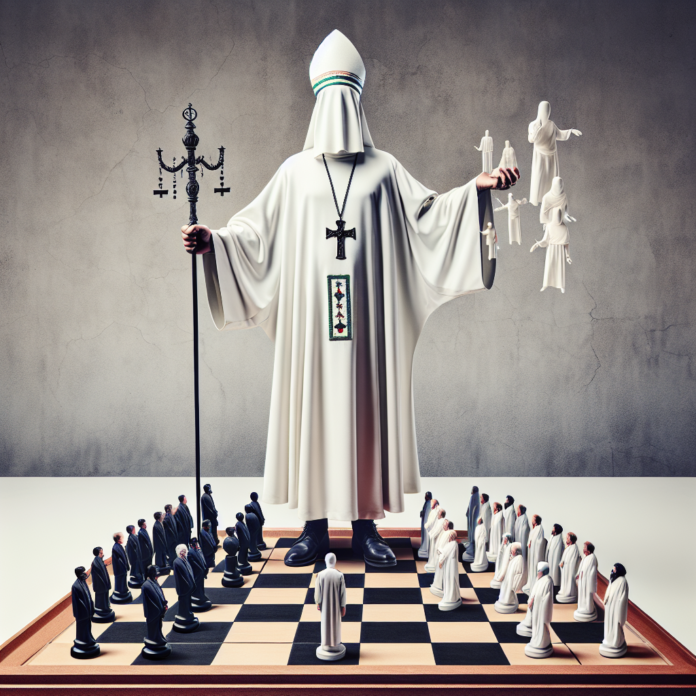The Roman Catholic Church, a global institution with centuries of history, has not been a stranger to controversies. Yet, few stories have been as sensational and damaging as that of Bishop Richard Williamson. A figure once cloaked in the traditionalist vestments of the Society of Saint Pius X (SSPX), Williamson’s journey through the annals of religious infamy is a tale riddled with Holocaust denial, explosive confrontations with the Vatican, and relentless defiance. This essay delves into the salacious details of his actions, which not only fractured the traditionalist faction he once led but also rippled far beyond religious boundaries, stirring international outrage.
The Making of a Maverick Bishop
Richard Williamson’s rise to notoriety began in the 1970s when he joined the SSPX, a traditionalist Catholic group founded by Archbishop Marcel Lefebvre. The SSPX was created in response to the liberalizing reforms of the Second Vatican Council, aiming to preserve what they viewed as the true essence of Catholic doctrine and practice. Williamson quickly climbed the ranks, becoming one of the Society’s most prominent voices and eventually being consecrated as a bishop by Lefebvre in 1988, an act performed without papal approval, leading to immediate excommunication.
Holocaust Denial: A Global Outrage
The pivotal moment in Williamson’s scandalous career came in 2009 during an interview with Swedish television. Williamson declared that the historical evidence was “hugely against six million having been deliberately gassed in gas chambers as a deliberate policy of Adolf Hitler.” This statement, blatantly denying the well-documented atrocities of the Holocaust, was not only false but deeply offensive, triggering a wave of condemnation from Jewish communities, historians, and the general public.
The timing of Williamson’s comments could not have been more critical or damaging. Just days before the interview aired, Pope Benedict XVI announced the lifting of excommunications for Williamson and three other SSPX bishops, a gesture aimed at healing the rift between the SSPX and the Vatican. The Pope’s decision was met with immediate backlash as Williamson’s Holocaust denial became a focal point of outrage. Critics accused the Vatican of being insensitive to the horrors of the Holocaust and failing to vet Williamson’s views adequately.
Legal Battles and Conviction
Williamson’s remarks led to legal repercussions, particularly in Germany, where Holocaust denial is a criminal offense. He was prosecuted and convicted for incitement in 2010, fined €12,000 (approximately $15,000), although this fine was later reduced on appeal. The legal battles further cemented Williamson’s reputation as a provocateur willing to court controversy, regardless of the consequences.
Expulsion from the SSPX
The fallout from the Holocaust denial scandal was far-reaching, affecting Williamson’s standing within the SSPX. Known for his hardline stances, Williamson often clashed with SSPX leadership, who were trying to navigate a delicate reconciliation with the Vatican. His defiance reached a boiling point in 2012 when he was expelled from the SSPX. The official statement cited his disobedience and disruptive behavior, but it was clear that his ongoing controversial comments and actions played a significant role.
Rogue Bishop: Consecrations and Continued Defiance
Even after his expulsion, Williamson remained unrepentant and continued to challenge both the SSPX and the broader Catholic Church. In 2015, he consecrated Jean-Michel Faure as a bishop without papal mandate, an act of ecclesiastical rebellion that drew widespread condemnation. This rogue consecration highlighted Williamson’s commitment to his radical vision of Catholicism, one that defied both traditional church authority and the norms of modern society.
The Legacy of Controversy
Williamson’s saga is more than a personal story of scandal; it is a reflection of the deep tensions within the Catholic Church regarding tradition and modernity. His actions and statements have exposed the fault lines between different factions within the Church, particularly between those who seek to preserve a pre-Vatican II identity and those who embrace the reforms of the Council.
Moreover, his Holocaust denial has had implications beyond religious circles, intersecting with broader societal issues of historical memory, anti-Semitism, and freedom of speech. By denying the Holocaust, Williamson tapped into one of the most painful and contentious debates in contemporary history, aligning himself with the most extreme and discredited elements of historical revisionism.
Conclusion
The story of Bishop Richard Williamson is a cautionary tale of how extreme views and defiant actions can lead to a downfall of epic proportions. From his rise within the traditionalist SSPX to his explosive Holocaust denial and eventual expulsion, Williamson’s journey is a testament to the dangers of unchecked radicalism. His legacy serves as a stark reminder of the importance of accountability, the perils of extremism, and the ongoing struggle within the Catholic Church to balance tradition with the realities of the modern world.
As the Catholic Church continues to grapple with its internal divisions and external challenges, the scandalous tale of Bishop Williamson stands out as a vivid example of how one man’s controversial path can impact not just an institution, but the broader societal fabric.
